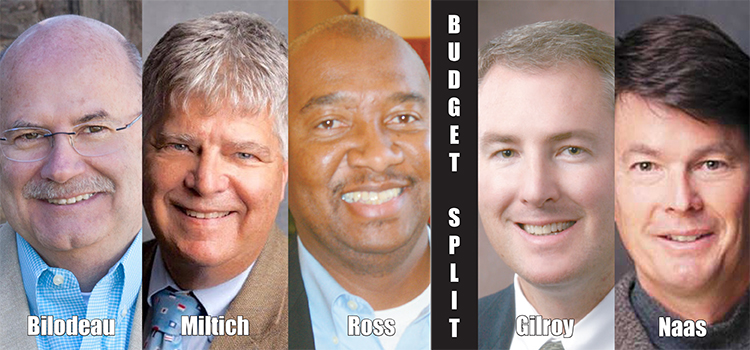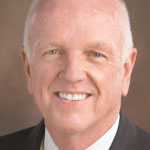
June 4. By Dave Yochum. In a 3-2 vote, the Cornelius Town Board approved a 2 cent increase in property taxes after a public hearing that saw a half-dozen residents speak out last night in favor of higher wages for staff and police.
Even with a 2 cent increase from revenue neutral, to 22.2 cents, the town’s $24.22 million budget is “non-sustainable,” according to Town Manager Andrew Grant.

GRANT
Town leaders “will need to make a future decision on tax rate or a future significant reduction in costs—cuts to services, reduction in capital projects, restructuring of existing services,” Grant said, suggesting property tax increases lie ahead.
It could mean that Cornelius’ claim to fame for so many years—we have the lowest tax rate for miles around—is in jeopardy and that prior budgets relied too heavily on debt more so than savings.
Last night the Town of Huntersville went revenue neutral: Their 2019-2020 tax rate is 24 cents.
Grant, in explaining his budget, said the town will have to “heavily scrutinize funding decisions for the next 10 years.”
Long-time Commissioner Dave Gilroy, who was one of the two commissioners voting against the budget—Kurt Naas was the other—said “this budget…falls short of what the citizens expect from us.”
“There are 32,000 folks out there, a vast majority of them who don’t engage, but we represent them too and what they think counts,” he said, referencing those who spoke out in favor of

WASHAM
higher pay for town employees.
Mayor Woody Washam said the majority on the Town Board “made the solid decision to keep Cornelius fiscally sound, address the transportation needs of our town and maintain the wonderful quality of life that we all love.”
Gilroy disagrees with the mayor.
“I don’t think they would agree with this 13.4 percent tax hike,” Gilroy said. “This 13.4 percent tax increase hits taxpayers between the eyes.”
Employee compensation and how raises were given to town staff and police back in March has divided the town board. The town’s budget year begins on July 1 and ends on the following June 30 every fiscal year. The budget for each upcoming year is discussed, starting officially at the town board retreat in mid-March, noodled on during the spring, and adopted in June.
Back on March 4, commissioners Denis Bilodeau, Mike Miltich and Thurman Ross voted in favor of raises three-quarters of the way through the fiscal year, locking in raises that would have been part of 2019-2020 budget discussions that were to get started just three days later.
It was unusual, and caused rancor at the normally pleasant budget discussions held at the Graylyn Conference Center in Winston-Salem. Commissioner Naas fumed.
Almost exactly three months later he erupted: “This budget was DOA on March 4,” he said at Monday’s town board meeting.
“You should have these conversations in total,” he said, explaining that he is not necessarily against salary increases.
Indeed, it was the process, or lack of a process that rankled Naas and Gilroy. After lengthy public comments Monday night, and concerns expressed by Gilroy and Naas, Mayor Woody Washam called for a vote. Commissioner Miltich demurred.
The mayor called for the vote again, eliminating the possibility of more discussion in two weeks. The budget, by state law, must be adopted prior to the beginning of the new fiscal year July 1.
It passed 3-2, with the vote exactly the same as March 4: Bilodeau, Miltich and Ross in favor; Gilroy and Naas against.
“The mayor was in a rush to approve, probably getting tired of the bright spotlight on this year’s big tax increase, especially in the context of the big tax increases in 2006, 2011, 2016, and now here we go again,” Gilroy said.
The current tax rate was reduced by 3.3 cents to 22.2 cents, but much higher property valuations mean a tax increase for many residential and commercial property owners.
The mayor said he was comfortable with the decision back in March to raise salaries before the fiscal year was over. He said staff turnover was a “serious problem,” ranging from police officers moving on the town staff, including former Town Manager Anthony Roberts and Finance Director Jackie Huffman.
“I have been through many [budget] meetings and discussions. Back on March 4, the house was on fire,” Washam said, referring to staff departures.
“Three commissioners recognized that something needed to be done. I agree with that decision,” he said.
In FY 2022, the town plans to sell $4 million in Town Center Redevelopment Bonds and the remaining $1.1 million of thee 2018 Transportation Bonds, with a cumulative annual bonded debt service of $4 million.
In FY 23, debt service to annual expenditure ratio could reach 19 percent, due to the issuance of $44 million in bonds plus non-bonded principal.
But Gilroy was critical of Grant’s official explanation that debt service increases were the root cause of potential future cuts to services and capital projects.
“It’s not about debt service. That’s all hogwash,” said Gilroy, who heads up a financial consulting business that places chief financial officers temporarily or part-time in growing businesses.
Pointing to the revenue-neutral budget adopted in Huntersville last night, Gilroy said growth in recurring personnel and operating costs in Cornelius have jacked up the budget in years past, in spite of what seems like a low tax rate.
“Shame on us if we don’t have the lowest tax rate,” Gilroy said, pointing to our billion-dollar, 70-mile shoreline of Lake Norman.
Gilroy said the higher tax rate is attributable to “5%, 6%, 8% (this year 10.5%) annual increases in recurring personnel and/or operating expenses, compounding year after year, for a couple of decades now.”
“These growth rates are a multiple of the 1.5-2.0% that population and revenue naturally grows in our lovely town. That’s the problem. It’s really our only problem when it comes to the budget. It’s a lack of discipline,” Gilroy said.





